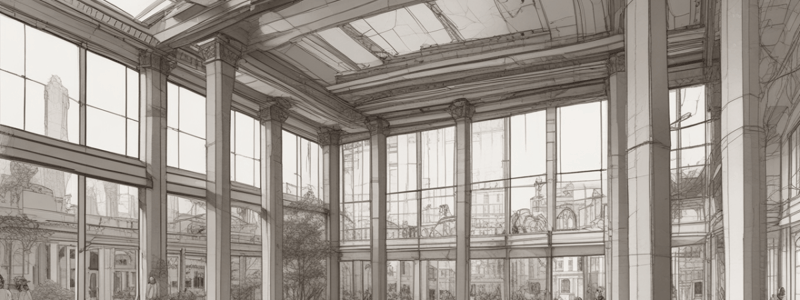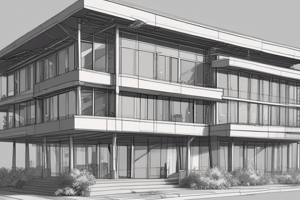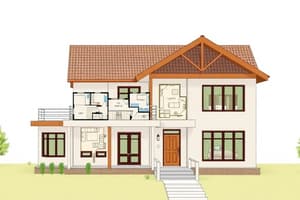Podcast
Questions and Answers
What is the primary purpose of interpreting a floor plan?
What is the primary purpose of interpreting a floor plan?
- To identify errors and ensure proper placement of elements (correct)
- To determine the cost of construction
- To select the color scheme and furniture
- To create a visually appealing design
When checking a kitchen floor plan, what should you verify?
When checking a kitchen floor plan, what should you verify?
- The window placements, cupboard spaces, and door orientations (correct)
- The color scheme of the kitchen
- The location of the refrigerator
- The placement of the dining table
What is crucial to ensure in the toilet and bathroom layout?
What is crucial to ensure in the toilet and bathroom layout?
- The proximity to the kitchen
- The size of the bathroom
- The placement of decorative items
- Proper plumbing alignment and privacy (correct)
When assessing the overall layout of a floor plan, what should you evaluate?
When assessing the overall layout of a floor plan, what should you evaluate?
What is the main objective of checking the bedroom layout?
What is the main objective of checking the bedroom layout?
Why is it essential to check the placement of sliding doors in living spaces?
Why is it essential to check the placement of sliding doors in living spaces?
What is the primary purpose of assembly diagrams?
What is the primary purpose of assembly diagrams?
What does a solid wall symbol on a floor plan represent?
What does a solid wall symbol on a floor plan represent?
What is the purpose of a floor plan?
What is the purpose of a floor plan?
What is represented by a straight line perpendicular to a wall and an arc indicating the swing direction on a floor plan?
What is represented by a straight line perpendicular to a wall and an arc indicating the swing direction on a floor plan?
What is the purpose of an elevation?
What is the purpose of an elevation?
What is the primary purpose of instructions for assembling?
What is the primary purpose of instructions for assembling?
What is represented by three parallel lines in a wall on a floor plan?
What is represented by three parallel lines in a wall on a floor plan?
What is the purpose of room labels on a floor plan?
What is the purpose of room labels on a floor plan?
Study Notes
Plans
- Instructions for assembling an item refer to written steps, often in short sentences, describing how to assemble that item.
- Assembly diagrams are annotated (labelled) pictures that explain in detail how to assemble an item.
Plans and Elevations
- An elevation is a view of a building's front, back, or side, helping to understand the structure's external dimensions and design.
- Elevations can include front elevation, side elevation, and rear elevation, each depicting the respective sides of the building.
Symbols on a Floor Plan
- Solid wall symbols represent walls that extend to the ceiling.
- Partial wall symbols represent walls that do not reach the ceiling.
- Window symbols are shown with three parallel lines in a wall.
- Door symbols are shown with a straight line perpendicular to a wall and an arc indicating the swing direction.
- Sliding door symbols are indicated differently from regular doors.
- Symbols for bath, toilet, and shower represent their placement within a building.
- Symbols for double kitchen sink, single bed, and single armchair indicate their exact locations.
Reading Floor Plans
- A floor plan provides a bird’s-eye view of a building, showing the layout and arrangement of rooms and fixtures.
- Key points to understand when reading a floor plan include:
- Identifying the front entrance and tracing the path through the house.
- Identifying doors and windows, which are essential parts of the floor plan.
- Identifying fixtures, such as baths, sinks, and toilets, which are marked because they are immovable once installed.
- Identifying room labels, which are the names of each room written on the plan.
Interpreting a Floor Plan
- Interpreting a floor plan involves identifying any errors and understanding the placement of various elements within the layout.
- Key points to consider when interpreting a floor plan include:
- Ensuring the logical arrangement of fixtures and entryways in each room.
- Ensuring door and window placements provide proper access and light without compromising privacy or functionality.
- Ensuring functional spaces, such as kitchens and bathrooms, are properly located and accessible.
Activity: Interpreting a Floor Plan
- When interpreting a floor plan, consider the following:
- Check window placements, cupboard spaces, and door orientations in the kitchen.
- Ensure proper plumbing alignment and privacy in the toilet and bathroom.
- Verify the placement of sliding doors and entry points in living spaces.
- Ensure proper door swings, window placements, and cupboard locations in bedrooms.
- Assess the orientation and functionality of the entire plan, ensuring logical flow and usability.
Studying That Suits You
Use AI to generate personalized quizzes and flashcards to suit your learning preferences.




